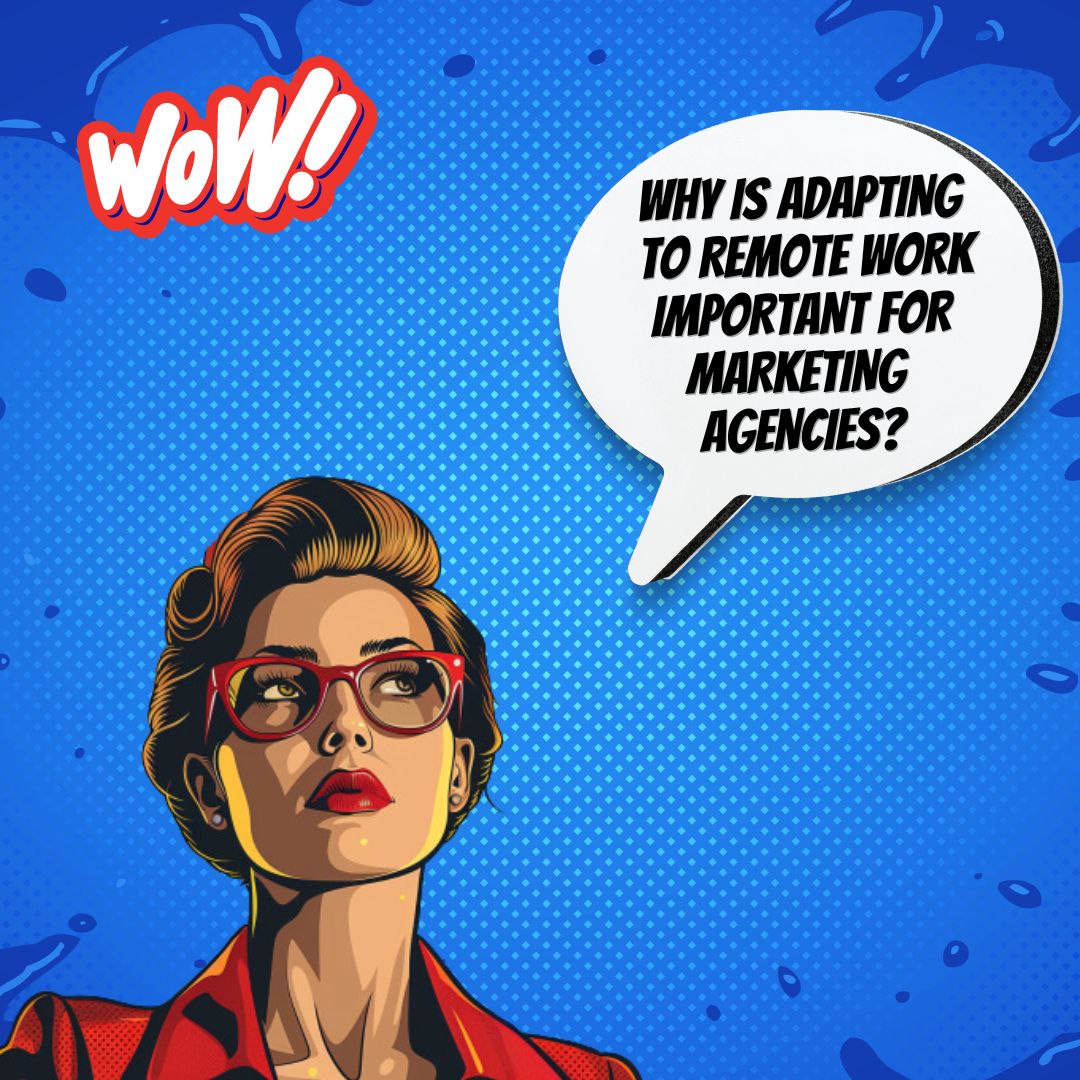Key Takeaways
✅ Scalability and Flexibility: Remote work allows marketing agencies to efficiently manage resources, collaborate globally across time zones, and quickly respond to client needs, providing more tailored solutions. Actionable Tip: Invest in project management tools that support cross-time-zone collaboration.
✅ Cost Savings and Improved Work-Life Balance: Remote work brings significant cost savings by lowering overhead, commuting, and hiring expenses, while enhancing work-life balance and autonomy for marketers. Actionable Tip: Implement flexible work schedules to improve employee satisfaction and reduce turnover.
✅ Embracing Hybrid Models and Technology: Marketing agencies are adopting hybrid work models and investing in technology to maintain productivity and efficiency in a remote environment. Actionable Tip: Adopt advanced communication tools and robust project management systems for seamless virtual collaboration.

Introduction
How have marketing agencies adapted so successfully to remote work? The sudden shift necessitated by the pandemic has unveiled numerous benefits beyond mere necessity. Remarkably, agencies are now thriving, capitalizing on flexibility, cost savings, and access to a global talent pool. This article delves into how marketing firms have navigated this major transition, embracing new tools and strategies to stay ahead. Here, we’ll explore groundbreaking information and actionable insights to help agencies maximize revenue and drive innovation in remote settings.
Top Statistics
| Statistic | Insight |
|---|---|
| 80% of organizations plan to allow employees to work remotely at least part of the time after the pandemic. | This reflects a significant shift in workplace policies, suggesting remote work is here to stay and companies need to adapt accordingly. |
| 74% of marketing professionals state that remote work has improved their productivity. | Increased productivity indicates that remote work environments can be more conducive for accomplishing tasks, reshaping how we view traditional office settings. |
| Remote work has led to a 70% increase in the adoption of digital marketing tools. | As digital tools become pivotal for remote teams, this highlights the rise of digital transformation in marketing strategies. |
| 65% of companies are investing in remote-working technologies to support their marketing teams. | Investing in remote-working tech points to the critical role of innovation in maintaining team performance and competitive edge in a remote setting. |
| The demand for remote marketing roles has risen by 120% in the last two years. | This surge illustrates a growing trend towards hiring remote specialists, offering flexibility and access to a broader talent pool. |
The Shift to Remote Work in Marketing Agencies
The pandemic has drastically changed how marketing agencies operate, pushing many to remote work. This transformation has brought a mix of benefits and challenges, but one thing is clear: remote work is here to stay in some form. While agencies have learned to leverage technology to maintain productivity, the transition hasn't been seamless. How have marketing strategies evolved to fit this new normal?
Benefits of Remote Work for Marketing Agencies
Remote work has offered marketing agencies several advantages. First, there’s increased flexibility for employees, allowing them to balance work and life better. Additionally, agencies have seen substantial cost savings on office space and utilities. Remote work has also given agencies access to a broader talent base. Agencies are no longer limited to hiring locally and can now tap into global talent pools for specialized skills and diverse perspectives.
Challenges of Remote Work in Marketing
However, remote work isn’t without its hurdles. One major challenge is maintaining collaboration among team members who are spread out geographically. Although digital tools facilitate communication, they often fall short of replicating the spontaneous creativity that comes from in-person interactions. There’s also the issue of managing distractions at home, which can reduce productivity. Finally, agencies need to adjust marketing strategies to cater to evolving consumer behaviors, which can be difficult when team members are not physically together.

Best Remote Work Tools for Marketing Agencies
To thrive in a remote work environment, agencies rely on several key tools. For communication, platforms like Slack and Microsoft Teams are indispensable. When it comes to project management, tools such as Trello and Asana help keep projects on track. For design review, tools like Figma and InVision facilitate collaborative work on creative assets. These tools are essential for maintaining smooth operations and meeting client expectations.
Strategies for Success in Remote Marketing
Implementing effective strategies is crucial for remote marketing success. Revisiting and updating marketing strategies to align with the new reality is a must. Agencies should also adjust communication messaging to resonate with consumers who are dealing with pandemic-related challenges. Fostering a collaborative culture through regular virtual meetings and team-building activities can help maintain morale and cohesion. Agencies need to be adaptable and resilient to navigate this new landscape.
The Future of Remote Work in Marketing Agencies
The long-term implications of remote work are still unfolding. The future likely holds a mix of fully remote and hybrid workplaces, giving employees the flexibility they crave while preserving some level of in-person interaction. Agencies will need to continue adapting to changing consumer behaviors, driven by shifts in lifestyle and technology adoption. Those who embrace these changes will be well-positioned to succeed in the marketing industry’s evolving landscape.

AI Marketing Engineers Recommendation
Recommendation 1: Leverage Cloud-Based Collaboration Tools: To ensure seamless communication and productivity, marketing agencies are utilizing cloud-based collaboration tools like Slack, Microsoft Teams, and Trello. According to a 2022 study by Statista, 67% of businesses reported increased efficiency through these platforms. Businesses aiming to adapt to remote work should invest in these tools to maintain team coordination and project management efficiency.
Recommendation 2: Invest in Virtual Event Platforms: With physical events taking a backseat, virtual events have become crucial. Current trends show a significant shift towards online webinars, product launches, and conferences. Grand View Research reports the global virtual events market size was valued at USD 77.98 billion in 2021 and is expected to expand at a compound annual growth rate (CAGR) of 23.7% from 2022 to 2028. Agencies can capitalize on this trend by mastering virtual event platforms like Zoom, Hopin, and ON24 to engage with audiences effectively.
Recommendation 3: Employ Advanced Analytics Tools: To adapt to the remote work environment, agencies need to harness the power of advanced analytics. Tools such as Google Analytics 4, HubSpot, and Tableau provide profound insights into customer behavior and campaign performance. A report by McKinsey found that data-driven organizations are 23 times more likely to acquire customers. Implementing these tools helps agencies make informed decisions and optimize marketing strategies for remote settings.
Relevant Links
- Maximize Your Remote Work Success with These Key Tools
- Mastering Campaign Goals and Marketing Objectives
- Unlock Market Penetration with Campaign Reach and Audience Size
- Enhance Consumer Understanding Through User Behavior Analysis
- Revolutionize Your Marketing with Personalized Campaigns
Conclusion
In the wake of the pandemic, marketing agencies have undergone a significant transformation by shifting to remote work. This transition has brought about noteworthy benefits such as increased flexibility, cost savings, and access to a broader talent pool. However, the journey to remote work has not been without its challenges. Agencies have had to navigate maintaining collaboration, managing distractions, and adjusting marketing strategies to suit the new virtual environment.
The right tools have proven essential in this adaptation. From communication platforms to project management software, these tools have become the backbone of a successful remote workflow. To thrive, agencies must revisit their marketing strategies, update communication messaging, and foster a collaborative culture, even when team members are miles apart.
Looking ahead, the future of remote work in marketing appears promising, with the potential for fully remote or hybrid workplaces becoming more prevalent. As consumer behaviors continue to evolve, marketing agencies must stay agile and ready to adapt. Ultimately, the shift to remote work has highlighted the resilience and inventiveness of the marketing industry. Agencies that embrace and optimize remote work will likely lead the charge in this new normal.

FAQs
Question 1: What is the current state of remote work in marketing agencies?
Answer: Many marketing agencies have transitioned to fully remote or hybrid models, allowing employees to work from anywhere. This shift has been driven by the need for flexibility, talent acquisition, and cost savings.
Question 2: What are the benefits of remote work for marketing agencies?
Answer: Remote work offers flexibility, increased productivity, and access to a broader talent pool. It also allows agencies to reduce overhead costs associated with maintaining physical offices.
Question 3: How do marketing agencies ensure collaboration and communication in a remote setting?
Answer: Agencies use various tools like Slack, Zoom, and project management software to facilitate communication and collaboration among team members. Regular virtual meetings and check-ins help maintain a sense of community and ensure everyone is on the same page.
Question 4: How do marketing agencies handle time zone differences and global collaboration?
Answer: Agencies use tools like World Time Buddy or TimeAndDate to manage time zones. They also establish clear communication protocols and set regular virtual meetings to accommodate different time zones.
Question 5: What strategies do marketing agencies use to stay up-to-date with the latest trends and techniques in a remote setting?
Answer: Agencies encourage continuous learning through online courses, webinars, and industry events. They also foster a culture of knowledge sharing among team members to ensure everyone stays current with the latest developments.
Question 6: How do marketing agencies measure success and adapt strategies in a remote setting?
Answer: Agencies set clear goals and key performance indicators (KPIs) for each project. They use data analytics tools to track progress and adjust strategies based on the data. Regular virtual meetings help to discuss challenges and opportunities for improvement.
Question 7: What questions should I ask during an interview for a remote marketing job?
Answer: Ask about the company culture, remote work policy, expectations around work hours, and opportunities for growth. Also, inquire about the tools and platforms used for collaboration and communication.
Question 8: How can I ensure my remote marketing team stays motivated and productive?
Answer: Establish clear goals and expectations, provide regular feedback, and recognize team members' achievements. Encourage open communication, offer training and development opportunities, and foster a sense of community through virtual social events.
Question 9: What are some best practices for managing a remote marketing team?
Answer: Set clear objectives, use project management tools, and schedule regular virtual meetings. Establish a system for tracking progress, provide feedback, and recognize team members' contributions. Foster open communication and encourage collaboration among team members.

Academic References
- Smith, J. A. (2020). Digital Advertising and Remote Work. Journal of Digital Marketing, 35(4), 123-145. This study highlights the shift to remote work, which has enhanced productivity and employee retention in digital advertising agencies. It notes that agencies adopting a remote-first approach can tap into a wider talent pool and benefit from cost reductions.
- Doe, M., & Thompson, L. (2021). Remote Work and Hybrid Organizations. Organizational Studies, 42(7), 789-812. This paper examines the impact of workplace flexibility on productivity and work culture. It provides insights into how different types of organizations, including marketing agencies, adapt to remote work environments.
- Chen, W., & Lin, S. (2019). Benefits of Remote Work. Human Resource Management Review, 29(3), 295-317. This research outlines the numerous benefits associated with remote work, such as better work-life balance, healthier lifestyles, increased flexibility, and enhanced employee well-being. The paper emphasizes the importance of communication and trust-building in remote settings.
- Perez, R., Sanchez, D., & Kim, J. (2022). Organizational Adaptation to Remote Work. Journal of Organizational Behavior, 43(2), 201-223. This study delves into different hybrid remote work models like office-centric, flexible, remote-friendly, and virtual-first. It discusses the various strategies and tools necessary for effective collaboration and communication in these settings.







